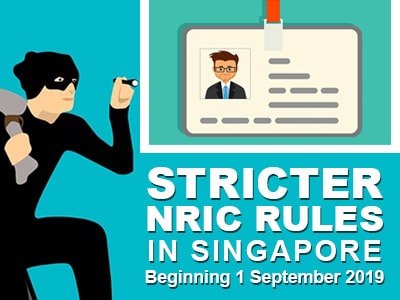Stricter National Registration Identity Card (NRIC) Rules in Singapore Beginning 1 September
 It Will Soon Be Illegal to Collect NRIC Numbers Without Authorisation
It Will Soon Be Illegal to Collect NRIC Numbers Without Authorisation
As of 1 September, stricter NRIC rules will be in place regarding collection and data disclosure. Companies need to comply or risk hefty penalties.
Singapore’s Personal Data Protection Commission (PDPC) is the country’s privacy watchdog. The PDPC governs the collection, disclosure and use of Singapore NRIC’s and other identification numbers. Unless otherwise required by law, companies must comply with the stricter NRIC rules. Under these rules, organisations are no longer allowed to hold onto any citizen’s NRIC and its full number. Doing so is considered illegal.
These stricter NRIC rules are applicable to other identification numbers used nationally in Singapore. This includes work permit numbers, birth certificate and foreign identification numbers. Beginning 1 September, NRIC numbers can only be collected if required by law. If needed, the details may be collected specifically to verify the identity of the individual. However, this must be handled with the highest degree of fidelity.
If an organisation needs to collect an NRIC number, they must first assess if retaining these numbers are a necessity. If it is not necessary, the PDPA suggests that the numbers be disposed responsibly. They must also be disposed of per the PDPA’s guidelines.
About NRIC Numbers
Singapore’s NRIC numbers are an identifying document which is both permanent and irreplaceable. These numbers are issued to citizens by the Singapore Government. NRIC numbers are used primarily for facilitating government transactions, and public administration purposes. As such, these numbers can be used to retrieved data pertaining to the individual. These stricter rules are in place to minimize unjustified collection, negligent handling and indiscrimination.
However, privacy advocates are arguing that despite the stricter NRIC rules, NRIC details are still collected. At times, the reasons for the collection are frivolous. The PDPA has assured that any unauthorised collection could result in a maximum penalty of $1 million.








